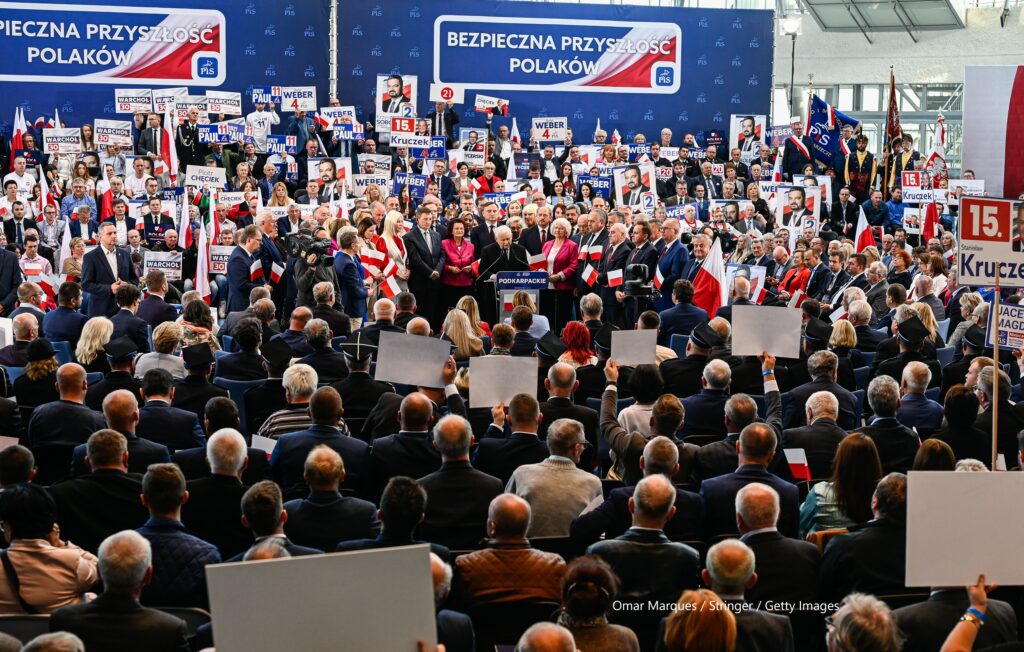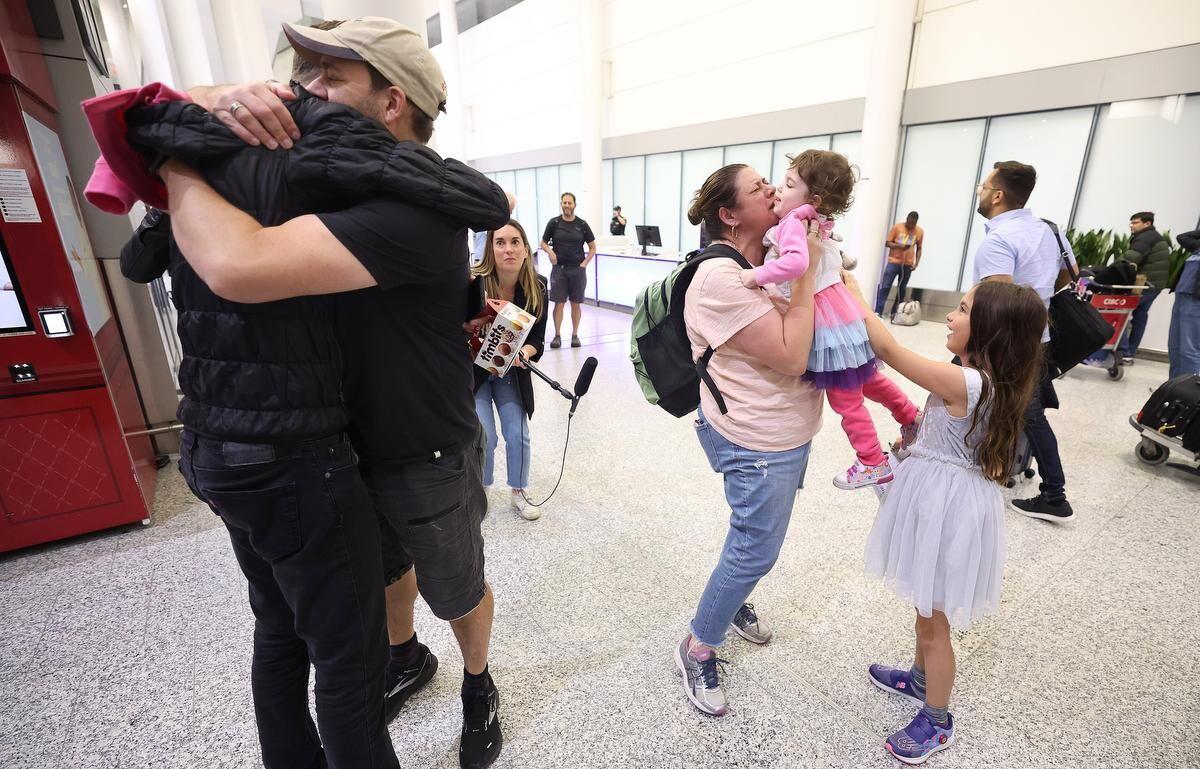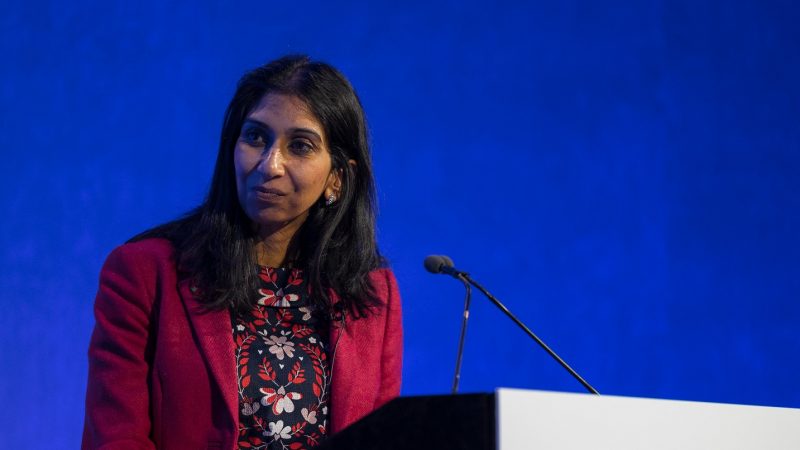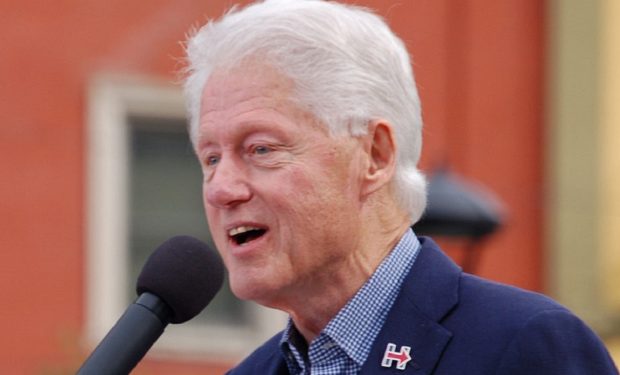The high stakes of Poland’s elections, explained.
/cdn.vox-cdn.com/uploads/chorus_image/image/72755041/1721948310.0.jpg)
Jen Kirby is a senior foreign and national security reporter at Vox, where she covers global instability.
WARSAW, Poland — “We have been talking that these are the most important elections since 1989, which was the first partly free elections since the fall of communism,” Jakub Kocjan, a rule of law campaigner for Akcja Demokracja, a Polish pro-democracy organization, told me from his apartment in Warsaw, less than a week before parliamentary elections that may determine the democratic future of Poland.
Behind him, a map of the European Union spans the wall. Another map, this one of Poland, hangs on the other side of the room. Kocjan sits in a desk chair, one leg extended and propped up on a bed. His foot is in a plastic boot, an old injury flaring up.
“There is some point,” Kocjan says, “where there is no possibility to go back to democracy.”
For Kocjan, and for many other civic and pro-democracy activists, opposition party members, and some observers, this October 15 election is that point.
Poland’s democracy is wounded, the consequence of eight years of rule by the right-wing populist Law and Justice Party (PiS). The party has captured state institutions and resources, dismantled the judicial system and constitutional courts, consolidated control over public media. The party has mainstreamed nationalism, which has put Poland at odds with the European Union and its members, like Germany and with other partners, most recently, Ukraine.
The stakes of the election are undeniable: If PiS wins again and returns to power, it will keep Poland on this illiberal path: more undermining of the rule of law and the judiciary; more domination over the media and the state resources; more tension with European partners. Which is why these elections feel to many like the most important vote in more than 30 years.
“This time, many people are expecting the same — but more. Stronger, with the Hungarian path actually becoming a reality,” said Piotr Łukasiewicz, a former Polish diplomat and analyst for security and international affairs with Polityka Insight, referring to Viktor Orbán’s authoritarian consolidation in Hungary.
“THERE IS SOME POINT WHERE THERE IS NO POSSIBILITY TO GO BACK TO DEMOCRACY”
Yet Poland is divided, and right now the elections are a bit too close to call — and that means, despite the odds, the democratic opposition has a chance to unseat PiS. PiS’s control of the media and state resources has skewed competition, but it has not eliminated it. Broad public frustration over the high cost of living has eaten away at PiS’s support, along with the rise of a more radical far-right party, the Confederation that has questioned Poland’s support for Ukraine, and is appealing to younger voters, especially men.
Jen Kirby traveled to Warsaw, Poland, days before the country’s October 15 vote. She met with activists, civil society leaders, and political and foreign policy experts, and wandered the streets of Warsaw asking people their biggest concerns ahead of Sunday’s parliamentary elections. Most people quickly walked away, although a few people stopped and shared their worries, frustrations, and hopes for Poland’s future.
The opposition centrist Civic Coalition, led by former Prime Minister Donald Tusk, is promising to restore Poland’s democracy and improve relations with Europe. Civic and an array of other opposition coalitions on the left, center, and center-right, are pulling close in polls. It is a catch-all, diverse group, but together they may be able to get PiS out of power and try to begin unraveling the illiberal regime it created.
None of this is a guarantee. PiS seems unlikely to win an outright majority, but it very much could still garner the most votes, enough to form a government, even if they have to seek the help of the more right-wing Confederation. Even if the opposition coalitions win enough seats to potentially form a government, it is likely to be a slim edge, under a very broad tent, and reliant on cooperation from many disparate groups, which may weaken its effectiveness. No matter who emerges, this parliamentary election could make Polish politics a lot more unstable. That may dislodge PiS for now, but make unpredictable what could replace it.
These election results also matter for more than just Poland. They will reverberate across Europe and the North Atlantic Treaty Alliance (NATO). Poland is Europe’s front line in Russia’s invasion of Ukraine, a critical transfer point for arms, and a host of more than 1 million Ukrainian refugees. The future of Poland’s democracy may influence regional stability and its future support of Ukraine; PiS has picked fights with Kyiv, in part, to fend off the rise of the far right, and if PiS retains power, those tensions may persist, another nick in an increasingly fragile Western coalition as the war moves closer to its third year.
Poland is not alone in being framed as a last-chance election: Recent votes in Brazil, Turkey, and soon the United States and India, all carry similar stakes. One election isn’t enough to unmake polarization or fully fix a faltering democracy, but it may be the first step to healing the break. This is Poland’s test: not just whether it can save its own democracy, but whether it can be a model for Europe and the world that it’s even possible.
“There are two feelings that everyone has,” Kocjan told Vox. “First is a lot of hope because we really know that we have this chance, and we cannot waste it. Because it will be too late.”
The other, he said, was anxiety that even if the opposition won enough votes, it would be able to take control. “It is really hard to imagine,” he said, referring to PiS, “that they will simply give the power to the other party.”
How do you win an election you’re rigged to lose?
Warsaw, Poland’s capital and biggest city, is largely an opposition town. The campaign signs at bus stops or on street signs skew toward the opposition, Koalicja Obywatelska (KO), or the Civic Coalition. On Nowy Świat, a main thoroughfare in Warsaw’s Old Town — the part of the city reconstructed after World War II to look like it did before it was destroyed — many voters criticized the direction of the country, the state of education, health care, and democracy. “I really want to change what’s been there so far,” one Warsaw resident told Vox. “My whole heart is with the Civic Coalition, with the opposition party.”
Elsewhere, near the Wileński (Vilnius) metro station in the North Praga, an area by the Warsaw district that had the most PiS support in the last parliamentary election in 2019, not everyone seemed eager to vote for PiS again. A woman sitting at a stand selling socks said she’d had enough and would definitely not vote for Jarosław Kaczyński, the deputy prime minister and leader of the PiS party. She recently had to buy medicine. It cost too much for her, and yet, she saw plenty of people getting benefits who didn’t work for them.
:no_upscale()/cdn.vox-cdn.com/uploads/chorus_asset/file/25000755/IMG_7452.jpg)
It reflected some of the fatigue around PiS. The right-wing party is socially conservative, but a lot of its popularity was built on its populist economic policies, which included generous welfare benefits like a child subsidy. PiS oversaw a period of growth, which they can’t take exclusive credit for, but their policies did benefit lower-income households, and so PiS became the party most trusted on economic issues.
But the economic aftershocks of Covid-19 and the war in Ukraine have raised Poland’s inflation to some of the highest in Europe and that has refracted onto PiS. PiS was popular as long as Poles felt things were improving, but now with the costs rising, support for PiS is flagging.
That did not necessarily translate to support for the Civic Coalition in this neighborhood though; one man said he’d take the current government over the opposition, but he’d prefer to clear them all out. Another woman said she wouldn’t vote because she didn’t like anyone.
Some of this disillusionment is because, as high as the stakes of the election, voters are mostly dealing with the same cast of characters (if that sounds familiar). Civic’s leader, Tusk, was the Polish prime minister from 2007 and 2014 and is the former president of the European Council — that is, a guy who’s been around for a long time. “The Civic Coalition doesn’t look like a new offer,” explained Edwin Bendyk, chairman of the Fundacja im. Stefana Batorego, a pro-democracy organization, of some of the public’s hesitation around the party. Plus, media propaganda doesn’t help. Poland’s public media has relentlessly attacked Tusk, framing him as a European bureaucrat who is an agent of Germany, but also an appeaser of Russia. On Warsaw’s streets, residents repeated some of these attacks.
Still, it all felt fairly typical for a week ahead of a major election: the motivated, the undecided, the disillusioned, the indifferent. This is the trickiness of an illiberal democracy. It isn’t a fully authoritarian state where elections are a farce. The PiS has chipped away at the rule of law and democracy but not destroyed it entirely, and the beats of the electoral system are intact. The outcome of the vote is still uncertain, though exactly how uncertain is hard to know because it’s difficult to quantify exactly how far the scales have been tipped.
“The election will be free. It’s not fair because of the advantages that the government has. But it’s still more or less a functioning democracy,” said Adam Traczyk, director of More in Common Polska, a pro-democracy think tank.
The PiS party was legitimately elected in 2015, and since then has used the levers of power to capture the state and its institutions. PiS has subverted the constitutional and judicial system. PiS painted judges as post-communist holdovers, acting against the people’s interests — in part because they had previously thwarted some of PiS’s legislation and agenda, and they, after all, PiS had a democratic mandate. Poland’s Constitutional Tribunal is stacked with PiS loyalists and is now neutered to the point of dysfunction.
:no_upscale()/cdn.vox-cdn.com/uploads/chorus_asset/file/25000742/1719491233.jpg)
In this, and other ways, PiS has fully captured the state, subverting it to its own political interests. This election has shown just how tilted things are. PiS has turned public media into state propaganda that relentlessly attacks the opposition. In this campaign, PiS has raised funds from state-controlled entities and its employees. A state-controlled oil and gas company owns a press company that publishes almost 20 regional newspapers and hundreds of weeklies and online sites; they refused to publish ads for certain candidates because of their “left-wing” values. The PiS party has approved benefit and pension hikes ahead of this campaign.
“THE ELECTION WILL BE FREE. IT’S NOT FAIR BECAUSE OF THE ADVANTAGES THAT THE GOVERNMENT HAS.”
As a nationalistic party, PiS has also tried to hype up its base by fear-mongering around immigration, especially from the Middle East and Africa (though PiS itself was embroiled in a cash-for-visa scheme), and a meddlesome Europe that is trying to interfere in Poland. To motivate their supporters, PiS is staging a referendum it has little power to implement, with loaded questions like: Do you support “the admission of thousands of illegal immigrants from the Middle East and Africa, according to the forced relocation mechanism imposed by the European bureaucracy?”
PiS has also tweaked electoral rules, increasing polling stations in rural areas, places most likely to benefit PiS. It is likely PiS strongholds are already overrepresented since the country hasn’t updated its parliamentary count to adjust for potential population changes, and some estimates suggest cities — where the opposition tends to do well — are underrepresented. Right now, a record number of Poles — some 600,000 — have registered to vote abroad. Those will most likely favor the opposition, but they must be counted within 24 hours or they are disqualified, a rule PiS passed in January that notably does not apply to the rest of Poland’s votes.
These baked-in disadvantages are why the opposition faces steep odds, and it explains some of the desperation they feel. “For the opposition, this is seen pretty widely as an election that if they don’t win this one they might not be able to win another one, that the systemic advantage of the government would be so strong,” said Michal Baranowski, managing director for the German Marshall Fund East, in Warsaw.
Tusk and the opposition have framed this election as the last chance to save Poland’s democracy. Jakub (Kuba) Karyś, chair of Komitet Obrony Demokracji (Committee to Protect Democracy), said he believed if the opposition did not win these elections, they would be the last ones.
“Having this government for the third time would be a disaster because they will continue to close up this authoritarian system,” Bendyk said. Poland was not authoritarian yet; there was still a free press, strong civil society, and thriving local democracy which Bendyk described as the immune system in the democratic resistance. But one by one, PiS would target these. “It’s quite easy to lay down rules to demand you can be penalized for different actions,” Bendyk said. “It can be difficult to do what we are doing now.”
:no_upscale()/cdn.vox-cdn.com/uploads/chorus_asset/file/25000766/1711553833.jpg)
In her office in Warsaw, Marta Lempart, leader of Strajk Kobiet, or Women’s Strike, a women’s rights and pro-abortion-rights group, was preparing to film videos to respond to different election outcomes. She has campaigned against PiS’s strict abortion laws. I asked how the organization’s work would change if PiS won again. “When they close the system,” Lempart replied, “our operations will be different because I will be in jail, obviously.”
Can the opposition actually win?
The opposition has an incentive to hype the stakes and make this election existential. But most experts and other observers Vox spoke to agreed that Poland would continue on this anti-democratic path if PiS captured power again.
And, right now, the opposition does have a real, if tenuous, opening.
The cost of living concerns of the electorate are real. Beyond that, PiS is facing a challenge from its right, the radical, anti-establishment party Konfederancja, or Confederation. The group doesn’t really fit into neat boxes; it’s a wild mess of libertarians, conspiracy theorists, anti-vaxxers, antisemites, and incels. Confederation also has a strong anti-Ukraine strain, reviving historical grievances, criticizing the war and Poland’s support for it, and Warsaw’s welcome of Ukrainian refugees.
:no_upscale()/cdn.vox-cdn.com/uploads/chorus_asset/file/25000781/1685099823.jpg)
Broadly, Poles are still supportive of Ukraine and of Warsaw’s political and humanitarian response to Russia’s invasion, and Russia is too big of a security threat for a real pro-Russia party to thrive. But Confederation’s anti-establishment message is peeling off some disillusioned voters, especially from younger demographics. That has freaked out PiS enough that it has hardened its stance on Ukraine, an uncomfortable development for the Western alliance given Poland’s position on NATO’s eastern flank.
Together, though, PiS looks somewhat vulnerable. So the pro-democracy opposition is mobilizing. In early October, hundreds of thousands of opposition supporters attended a massive rally in Warsaw. Karyś, of the Committee to Protect Democracy, said his group has registered more than 27,000 volunteers so far to observe the polls.
The democratic opposition — both parties running and pro-democracy activists and civil society leaders — is a diverse group. They are unified to dislodge PiS, which gives the vote a bit of the feel of the 2020 US election: anti-Trump more than pro-Biden; anti-PiS more than pro-Tusk and pro-Civic. Kocjan, the rule of law campaigner, said people are trying to vote strategically; that is, if they live in a more conservative district, voting for the opposition party most likely to win, not necessarily the one they favor the most.
:no_upscale()/cdn.vox-cdn.com/uploads/chorus_asset/file/25000770/1258701754.jpg)
In 2020, PiS oversaw a near-total ban on legal abortion, one of the most extreme in Europe. Lempart, leader of Strajk Kobiet, is trying to motivate voters on the abortion issue, especially younger voters, ages 18 to 25, to convince them they can get enough pro-abortion MPs elected, they can dismantle these restrictions.
She noted that many young voters are disillusioned with the current political establishment — something backed up by surveys — but the opposition wasn’t offering a positive message, just criticizing young people, telling them to vote and save the country or else.
Her organization’s approach was to give voters a clear deliverable. “We’re saying ‘it’s absolutely okay if you don’t feel anything, when you see the flag, when you hear the anthem, if you don’t care what happens, [if] the call to save the country just doesn’t appeal to you,” she said. But the Parliament needs 50 percent plus one to change the abortion laws. “If you go and vote for abortion, believe that then we can deliver,” Lempart said.
Can Poland reverse its illiberal path?
The radical far-right Confederation may end up the decider on Poland’s democratic future. PiS is still likely to win the most seats in parliament, though it seems unlikely to secure an outright majority. It may have to look to its rivals in the Confederation. The Confederation hates PiS because of its welfare spending; going into government with them would probably destroy their anti-establishment credentials. Still, PiS might just need to persuade a few opportunistic politicians to switch sides.
And even if the opposition can pull it out, the path forward is likely turbulent and tricky. One wild and risky possibility is the far-right Confederation tolerating a minority government led by the Civic Coalition. And no matter what, PiS is unlikely to go quietly. Their allies are in the courts, including the ones that deal with elections. Their allies control the business interests. Their allies control the messages on public media.
“If the opposition really manages to win or has enough votes to form a coalition, it’s not that on the 16th of October, we will all be sitting and singing Kumbaya and everything will be fine,” said Maria Skóra, a researcher at the Institute for European Politics (IEP), in Berlin. “The thing is that Law and Justice will not give up their powers too easily.”
Which is why many activists, experts, and observers in Warsaw seemed to think the most likely outcome of this election is one of instability: a fragile, messy government that might not last very long. That instability still offers the chance of evicting PiS from some of the centers of power, but the consequences of that are just as uncertain. It might make it far more difficult to undertake any meaningful reforms, and the opposition in disarray could be replaced by an emboldened PiS or a radical right, maybe in snap elections next year.
Even if the opposition does take control, it is a prospect — but not a guarantee — of change. “We also realize that the democratic opposition parties are not angels,” Bendyk said. But, he added, “At least open the window for opportunity for changes.”
What that window looks like is hard to say because reversing an illiberal democracy hasn’t really been done. “You don’t have an example of a country where you had an illiberal regime, established over years, and then rolled back by a democratic, liberal government,” said Piotr Buras, head of the Warsaw office for the European Council on Foreign Relations. Because Poland isn’t a full-on authoritarian system, you can’t just start from scratch. If the opposition gets into power, it will be because it won an election, after all. “An illiberal regime, this is a different animal,” he added.
Experts and activists suggested the opposition might find some tasks easier than others: replacing people at the public media station, or disentangling some of the state-controlled businesses from the state. But for the judiciary and the courts, even experts are perplexed by some of the changes there. How to unravel that and restore rule of law will be a complicated, and maybe even doomed process. On top of that, Poland’s PiS-aligned president, Andrzej Duda, will be in power until at least 2025. He can veto legislation, which a divided Parliament probably won’t have the votes to override.
“It’s the question,” Tracyzk said. “Do you want to do it quickly? Or create possibly even more chaos risking that every four years there will be chaos once again? Or do you want to try to do it kind of in a more democratic stable manner, knowing that it will take more time, knowing that you will not be able to fix all the things that quickly?”
The very high stakes of Poland’s election — for the country and the world
Yet Poland, if it has the chance, has to try. These elections are critical for global democracy but also for Europe and the rest of the world. The PiS party has challenged Europe and the supremacy of its rule of law, a perpetual and persistent problem from the bloc. PiS is picking fights with its neighbors, like Germany, at a time when Europe is trying to figure out its own future — on foreign policy, governance, and security. Tusk, a former European official, will almost certainly reset Polish relations with the EU, although he’ll be dealing with a long list at home.
But the war in Ukraine looms over all of it. After Russia’s full-scale invasion, Poland emerged as Ukraine’s ironclad supporter. Poland used this position to rally other EU countries, putting pressure on its partners, like Germany, to deliver tanks. It won some goodwill, including from the EU, and some saw it as a sign that Warsaw might become the new power center in Europe and of NATO.
That has since shifted. The Polish public remains broadly supportive of Ukraine and of hosting Ukrainian refugees, but inflation and inflammatory rhetoric, especially by the Confederation, has eroded some of that enthusiasm. As a result, the PiS party has turned Ukraine into an electoral issue, most notably with its dispute over Ukrainian grain.
Poland has said the transit of Ukranian grain into Europe is hurting undermining Polish farmers (who also happen to be an important voting bloc for PiS), and so it (along with some others) would defy a EU rule and continue banning Ukrainian grain imports. The spat culminated with Polish Prime Minister Mateusz Morawiecki saying last month that Poland was no longer giving weapons to Ukraine. This was a bit misleading; Poland continues to be a transfer point for international aid and weapons, but Poland itself is not sending more weapons, mostly because it has already given everything it has to give. But the damage was done.
“How can this Polish government go back and become an advocate again, and actually name and shame our bigger allies — Europeans, Americans, as well, to some extent — on sending more, or sending more advanced weapons?” Baranowski, of GMF, said. “We, as a country, just gave away a huge chunk of credibility that could have been used and was used successfully.”
:no_upscale()/cdn.vox-cdn.com/uploads/chorus_asset/file/25000785/1620669204.jpg)
As experts said, Ukraine is not about to break with the Western alliance; it still sees Russia as too big of a threat and the war as critical to its security. But as the war enters something of a standstill, Poland’s domestic politics could spill over and further strain the Western alliance, which is already under pressure, especially as the United States now struggles to approve Ukraine aid. And if the PiS party must work with the Confederation to stay in power, Poland’s tensions with Ukraine may only grow deeper.
Although the PiS party has sold itself as the real protectors of Poland, if opposition wins they will continue support for Ukraine, and potentially offer a little relations reset. Beyond that, so much of the rhetoric around Ukraine support revolves around defending democracy — even as some of its supporters, like Poland, are not exactly living up to those values.
With Sunday’s election, Poland has the chance to rebuild its democracy, as it also defends the one next door. “Poland is the final buffer between the West and the East,” said Karyś. “It’s incredibly important for Europe and the world for it to be there.”
















